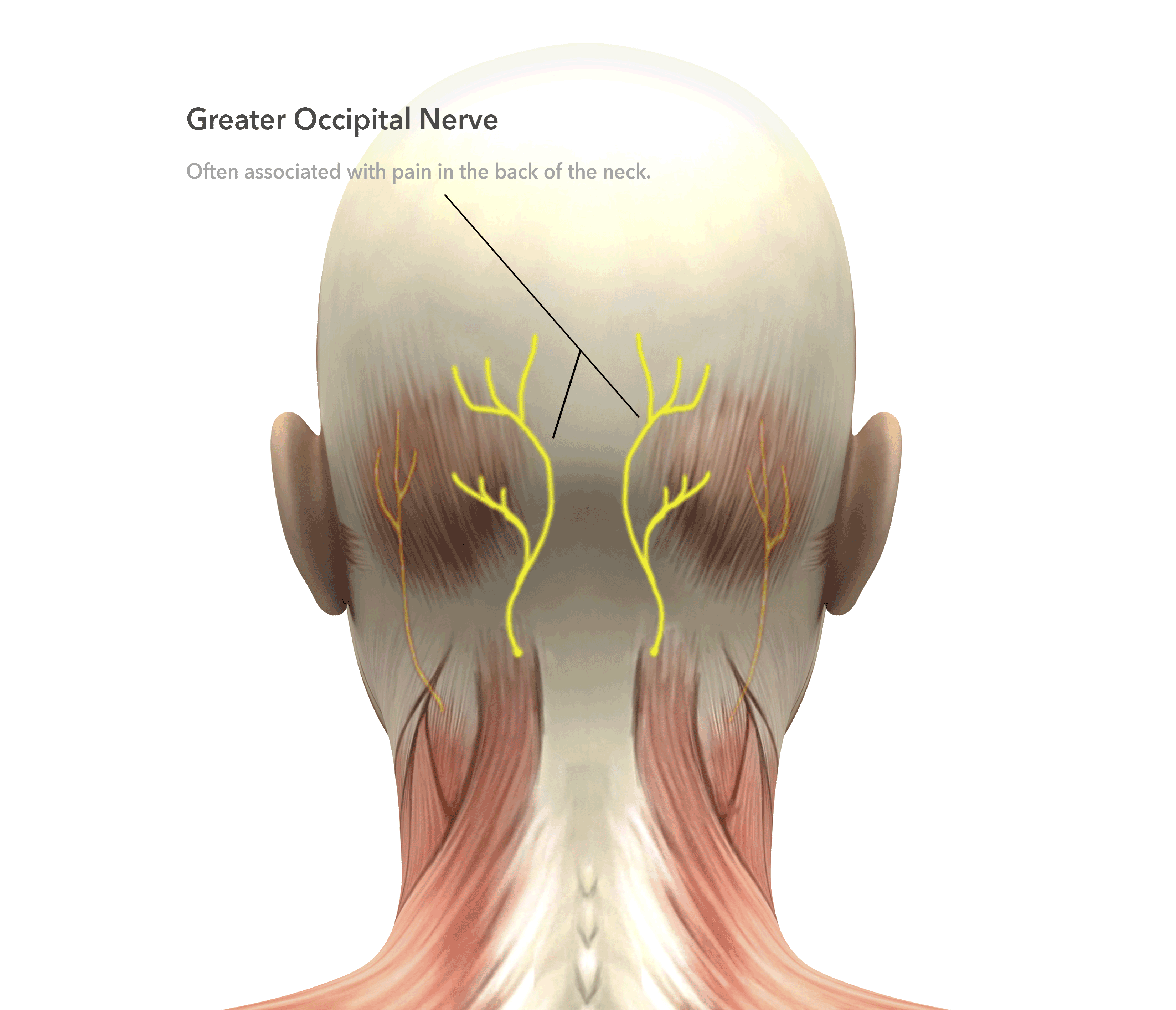Covered by OHIP?
Most services are covered by the Ontario Health Insurance Plan (OHIP)
Waiting Time
Your timeframe depends on the type of procedure.
OHIP Covered Services
Most services are covered by the Ontario Health Insurance Plan (OHIP)
WILDERMAN MEDICAL CLINIC
About Occipital Neuralgia
Occipital neuralgia is a specific type of headache disorder.
It is characterized by shooting or stabbing pain, typically beginning at the top of the spine and traveling up the occipital nerves in the neck and to the back of the scalp.
The pain can occur on either one or both sides and may spread as far as the sides of the head and behind the eyes. The pain can last between a few seconds to minutes.
Pain attacks can be triggered even by slight irritation of the area, and are sudden, severe, and brief.
Who is affected?
Most of the time, the underlying cause of occipital neuralgia is unknown; however, the condition involves irritation of the occipital nerves that could be caused by injury or inflammation.
Some examples of underlying conditions that may result in occipital neuralgia include trauma to the area, chronic tension in the neck, arthritis, diabetes, tumors, or gout.
What are the symptoms?
Typical symptoms of occipital neuralgia can include aching, throbbing, or burning pain, which can also be accompanied by sharp or shooting pain. Tenderness and sensitivity in the neck and or scalp area may also be present.
Some other commonly associated symptoms include dizziness, nausea, sensitivity to light, and tinnitus.
What causes it?
Occipital neuralgia occurs when the occipital nerves become irritated or compressed, resulting in pain caused by spasms and muscle cramps.
The compression of the nerves can occur due to injury or tension in the affected area, such as from chronic neck tension, or head or neck injury.
How is the condition diagnosed?
Because occipital neuralgia can present with similar symptoms to other headache disorders (e.g., migraine, tension headache, cluster headache), diagnosis can be a challenge.
However, it is important to be properly diagnosed, as typical treatments for other headache conditions are not effective treatments for occipital neuralgia.

Your doctor will first take your medical history, including details regarding any injuries you may have had.
The doctor will also complete a physical exam, pressing around the affected area. The doctor may then further order other tests such as blood tests and an MRI scan.
A diagnostic nerve block may be used to confirm a diagnosis of occipital neuralgia.
What are potential treatments?
Treatment primarily aims to relieve pain associated with occipital neuralgia. The type of treatment may therefore depend on the underlying cause.
Typical conservative treatment options include rest, applying heat to the affected area, massage, acupuncture, or anti-inflammatory medications.
Other medications that can be used to treat occipital neuralgia include antidepressants, antiepileptics, serotonin-norepinephrine reuptake inhibitors, and in some cases opioids.
If initial conservative treatments are unsuccessful, other treatments may be tried, which can include nerve block injections, neurostimulation, or occipital nerve pulsed radiofrequency ablation.
Surgical procedures are reserved for only extreme cases where all other forms of treatment are unsuccessful.
Surgical procedures for occipital neuralgia include microvascular decompression and occipital nerve stimulation.
Treatments we offer
Medication
Certain prescription medications can be used to treat occipital neuralgia. These include:
– Muscle relaxants
– Antiseizure medications (eg., pregabalin, gabapentin)
– Tricyclic Antidepressants
Nerve block injections with local anesthetic or cortisone
Nerve block injections can be performed to confirm a diagnosis of occipital neuralgia and can also be used to treat the pain associated with occipital neuralgia.
During this procedure anesthetic or cortisone is injected into the base of the nerve.
The pain relief usually occurs within minutes and continues long-term. However, success varies from patient to patient
Therapeutic nerve block injections with Botox
Botox can also be used to treat occipital neuralgia. Botox is injected into the area of the neck surrounding the occipital nerves. The pain relief can take a little longer to occur but has been reported to last for up to 24 weeks.
Physiotherapy
Occipital neuralgia can also be treated with Transcutaneous Electrical Nerve Stimulation (TENS). TENS makes use of low-voltage electrical currents that are applied via electrodes attached to the area of pain on the skin.
The electrodes stimulate the affected nerves and the electrical currents prevent the pain signal from being transmitted to the brain.
It has also been suggested that this treatment can induce the production of endorphins by the body, which act to reduce the perception of pain.
This form of treatment is non-invasive, non-medicinal, and a relatively inexpensive option to treat occipital neuralgia pain. We provide education sessions on how to use TENS so you can use it more efficiently at home.
Other treatments not available at our clinic:
Acupuncture
Acupuncture can be used to treat occipital neuralgia by inserting acupuncture needles into specific areas of the skin close to the nerves.
This nerve stimulation sends messages to the brain that results in the release of ‘feel good’ hormones that can cause a reduction in the feeling of pain.
Radiofrequency ablation
Radiofrequency ablation (RFA) is a procedure that is used to stop the pain signals that are sent from the occipital nerve to the brain.
During this procedure, a needle electrode is inserted and an electrical current is used to heat and destroy the affected nerve. The procedure is minimally invasive and patients are typically able to return to work within days of treatment.
The pain relief can take up to three weeks to take effect and can be long-lasting.

